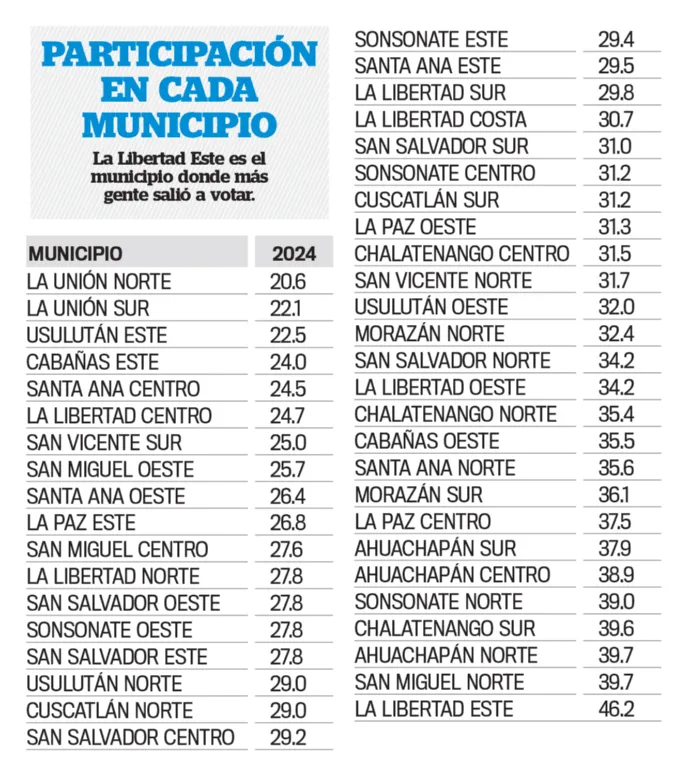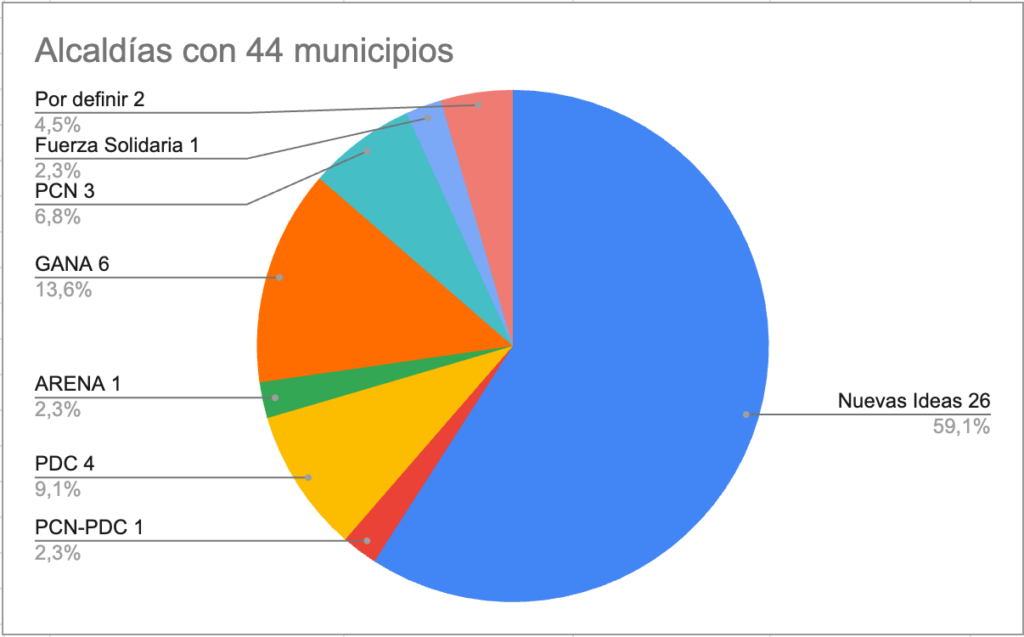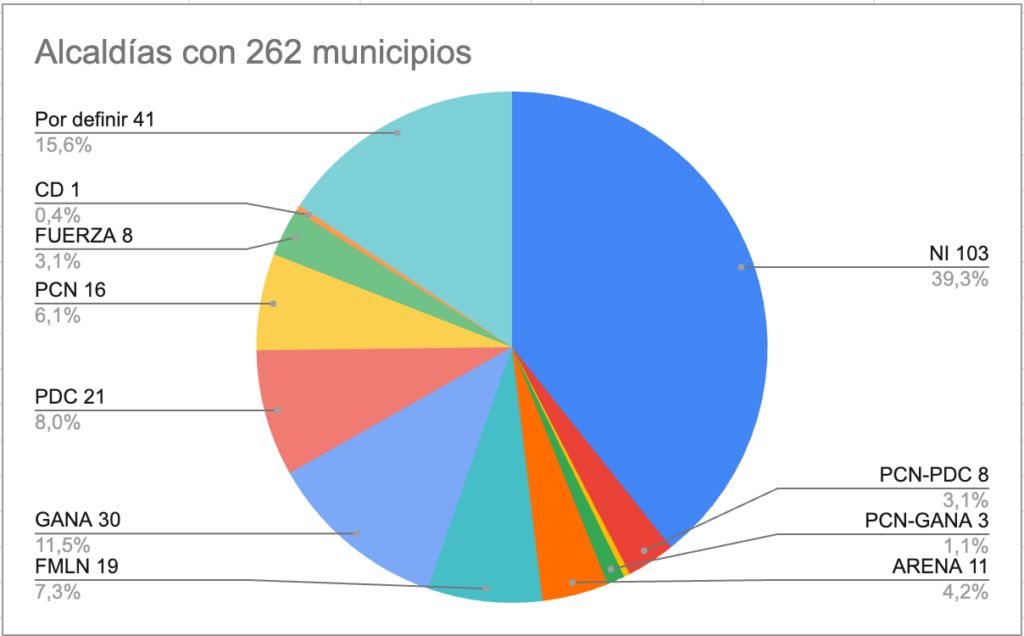Absenteeism and Gerrymandering Undergird Municipal Election Results
Nearly two years into a State of Exception, El Salvador held municipal and Central American Parliament (PARLACEN) elections on Sunday, March 3. With 30.1% voter turnout, the lowest since the 1992 signing of the Peace Accords, and a newly-gerrymandered electoral map, Nayib Bukele’s Nuevas Ideas (New Ideas) party appears to have won mayoral races in 28 newly-created municipalities. Parties allied with Bukele-- GANA, PDC, PCN, and Fuerza Solidaria-- have won 6, 4, 3, and 1 municipalities, respectively. Only one opposition party candidate won a mayoral race, with right-wing ARENA candidate Milagro Nava defeating the high-profile Nuevas Ideas candidate, Michelle Sol.
Reforms and Low Turnout
Electoral reforms, passed by the Nuevas Ideas-controlled legislature in 2023, drastically reduced the country’s municipalities, from 262 to 44. Sunday's historically low turnout is likely a result of a variety of factors, including waning trust in the TSE and its ability to carry out a trustworthy election following the failure of the February 4 elections, and may also be a reflection of attitudes towards this reduction in local representation. The vote count has not been finalized, but Sunday’s 30.1% turnout is a historical low. 49.0% of eligible Salvadorans voted in the previous municipal elections in 2021, indicating a 38.6% decline in voter turnout.
The chart below indicates voter turnout percentages by municipality.

Source: La Prensa Grafica
The municipal changes combined up to 20 former municipalities into one, and were designed to give Nuevas Ideas an electoral advantage. Despite this gerrymandering and reduction in municipalities, Bukele’s party appears to have significantly underperformed on Sunday. Initial results indicate that they will control 28, or 64% of the new municipalities (not including municipalities controlled by allied parties). If the electoral map had not been redrawn, they would have won only 39% of all municipalities. If the electoral support Nuevas Ideas received in the 2021 elections were to be applied to the new municipality borders, they would have won 73% of the 44 mayorships - a clear indication of the significant loss of support for Nuevas Ideas candidates. With just over 78% of the votes counted, Nuevas Ideas has received 36.4% of votes, nearly 50% lower than what Bukele won in the presidential election. Given the historically low turnout, their support is equivalent to a scant 8.4% of the voter roll. While more pronounced in the municipal election, a similar drop in support was also seen for Nuevas Ideas legislative candidates in February.
Notwithstanding Nuevas’ Ideas performance, Nayib Bukele took to X (formerly Twitter) to proclaim that the opposition won only one municipality while “parties that support [his] project'' won 43 out of 44, referring to the municipalities where the candidates of four other right-wing Nuevas Ideas-aligned parties were elected as mayors. The National Unity Alliance (GANA), Christian Democrat Party (PDC), National Reconciliation Party (PCN), and Fuerza Solidaria will lead 6, 4, 3, and 1 municipalities, respectively. The Nationalist Republican Alliance (ARENA), a right-wing opposition party, won a closely-watched municipality in which long-time mayor Milagro Nava defeated Michelle Sol, Bukele’s current Housing Minister.
The leftist Farabundo Martí National Liberation Front (FMLN) did not win any mayorships for the first time since they began participating in elections in 1994.
Bukele’s 2020 near-elimination of the Social Development Fund (FODES), which significantly reduced local budgets, drastically impacted the functioning of local governments. One-third of the FODES funds were redirected to the newly-created (and executive-controlled) Public Works Directorate (DOM). The DOM, whose workers’ uniforms and even heavy machinery and cones are branded with the same cyan color as the Nuevas Ideas party, ramped up their inauguration of public works in the days leading up to Sunday’s election, in violation of campaign laws.
The historically-low turnout may also be attributable to the role of the Supreme Electoral Tribunal (TSE), the country’s highest electoral body. The TSE is tasked with running the elections and making sure electoral laws are followed. After approving Nayib Bukele’s unconstitutional candidacy for February’s presidential elections, the TSE’s technical equipment for counting and transmitting February’s election results failed. This led to a weeks-long count of the presidential and legislative ballots, marred with irregularities, intimidation, and indications of fraud. All four opposition parties (FMLN, ARENA, Vamos, and Nuestro Tiempo) participating in the election petitioned the TSE, unsuccessfully, to have the legislative election results annulled.
The TSE’s role in Sunday’s election has also been criticized. ARENA and the FMLN, the two principal opposition forces, publicly denounced the TSE for supplying them with hundreds fewer election monitoring credentials than they were owed. Before Sunday’s election, Observa 2024, a consortium of electoral observation organizations, had registered 235 cases of using public funds for electoral purposes. 80% of the cases were in support of Nuevas Ideas candidates. The TSE has not responded to these allegations.
FMLN Disproportionately Affected by Reforms
The 2023 municipality consolidation has most significantly affected the FMLN. Applying Sunday’s results to the former municipal lines, the FMLN would have won 19, or 7.4% of mayorships. While they will be left without mayors for the first time since their establishment as a political party, the preliminary vote count suggests that they will have city council representation in many municipalities and potentially two representatives in PARLACEN. In the new South Chalatenango municipality, which combined 20 former municipalities, they would have won 10 mayorships, but it was not enough to win the new municipality.
ARENA’s representation also suffered as a result of the changes. They won 4.2% of districts (11 former municipalities), but their sole mayorship victory leaves them with only 2.3% of the total. Leaders of both parties, following the elections, announced a total restructuring of their parties is to come.
The graphs below, from Revista Factum, compare Sunday’s results using the new (44 municipalities) and old (262 municipalities) maps.


Source: Revista Factum
On Tuesday, the Popular Resistance and Rebellion Bloc (BPR), the country’s largest leftist grassroots coalition, released a statement calling on the Salvadoran population to organize. They state that the electoral fraud, most significantly exemplified by Bukele’s unconstitutional reelection, has been consummated. The statement, released on Facebook, is accompanied by a short message: “Democracy is built in the streets, in unions, in communities, in cooperatives, and in every expression of the people.”
With International Women’s Day marches planned for this weekend, popular movements will have their first opportunities to display their opposition to the consolidation of a dictatorship and total right-wing government control .

 "I am a CISPES supporter because continuing to fight for social justice and a more people-centered country means continuing the dream and sacrifice of thousands of my fellow Salvadorans who died for that vision.” - Padre Carlos, New York City
"I am a CISPES supporter because continuing to fight for social justice and a more people-centered country means continuing the dream and sacrifice of thousands of my fellow Salvadorans who died for that vision.” - Padre Carlos, New York City

